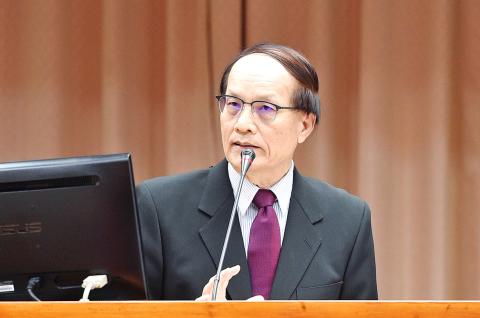The National Palace Museum in Taipei is planning to close for renovations for three years beginning at the end of 2020, Chinese Nationalist Party (KMT) Legislator Ko Chih-en (柯志恩) said yesterday.
Museum Director Chen Chi-nan (陳其南) delivered a report to the Education and Culture Committee at the Legislative Yuan in Taipei and Ko said that documents given to her during a question-and-answer session by museum staff showed that the museum’s library would close on July 1 following an exhibition featuring works by artist Chang Dai-chien (張大千).
The museum’s main building is expected to close at the end of 2020 and be cleared out starting in 2021, with renovation work to take place in 2022 and 2023, she said.

Photo: George Tsorng, Taipei Times
The museum, which houses a wide collection and attracts nearly 5 million visitors each year — the majority of them foreign tourists — has not closed since it was founded, she said.
Ko expressed concern over whether the museum had measures in place for a closure of such magnitude.
The New National Palace Museum Plan documents that the Taipei branch would undergo renovation and expansion work, Chen said, adding, however, that the document did not outline the schedule, as it was not ready when the document was written.
Almost all of the museum’s buildings are to be renovated, he said.
He said museum staff have experience hosting exhibitions and operating amid construction and the consensus was that they would not repeat that experience.
Asked by Ko to clarify whether artifacts at the Taipei branch would be moved to the National Palace Museum Southern Branch in Taibao City (太保), Chiayi County, during the three-year closure, Chen said the museum considers both branches to be part of the museum, so regardless of the duration of renovations — be it three years or five — it would not be a closure, but rather a change of venues.
The museum hopes to attract more foreign visitors to the southern branch, Chen said, adding that while three-quarters of visitors to the Taipei museum are foreigners, the southern branch struggles in this regard.
Separately yesterday, Chiayi County Commissioner Helen Chang (張花冠) said she proposed years ago that the museum’s items be exhibited at the southern branch.
The Chiayi City Government welcomes this move, she said, adding that it would bring more tourists to Chiayi and spur national development.
However, Democratic Progressive Party Taipei mayoral candidate Pasuya Yao (姚文智) yesterday echoed concerns that renovation work at the Taipei branch would affect tourism in the capital.
Yao said the Chiang Kai-shek Memorial Hall should be converted into the museum’s second venue in Taipei.
Then it could be used to exhibit the museum’s most popular artifacts, he said.
Additional reporting by Chou Yan-yu

ENDEAVOR MANTA: The ship is programmed to automatically return to its designated home port and would self-destruct if seized by another party The Endeavor Manta, Taiwan’s first military-specification uncrewed surface vehicle (USV) tailor-made to operate in the Taiwan Strait in a bid to bolster the nation’s asymmetric combat capabilities made its first appearance at Kaohsiung’s Singda Harbor yesterday. Taking inspiration from Ukraine’s navy, which is using USVs to force Russia’s Black Sea fleet to take shelter within its own ports, CSBC Taiwan (台灣國際造船) established a research and development unit on USVs last year, CSBC chairman Huang Cheng-hung (黃正弘) said. With the exception of the satellite guidance system and the outboard motors — which were purchased from foreign companies that were not affiliated with Chinese-funded

PERMIT REVOKED: The influencer at a news conference said the National Immigration Agency was infringing on human rights and persecuting Chinese spouses Chinese influencer “Yaya in Taiwan” (亞亞在台灣) yesterday evening voluntarily left Taiwan, despite saying yesterday morning that she had “no intention” of leaving after her residence permit was revoked over her comments on Taiwan being “unified” with China by military force. The Ministry of the Interior yesterday had said that it could forcibly deport the influencer at midnight, but was considering taking a more flexible approach and beginning procedures this morning. The influencer, whose given name is Liu Zhenya (劉振亞), departed on a 8:45pm flight from Taipei International Airport (Songshan airport) to Fuzhou, China. Liu held a news conference at the airport at 7pm,

Authorities yesterday elaborated on the rules governing Employment Gold Cards after a US cardholder was barred from entering Taiwan for six years after working without a permit during a 2023 visit. American YouTuber LeLe Farley was barred after already being approved for an Employment Gold Card, he said in a video published on his channel on Saturday. Farley, who has more than 420,000 subscribers on his YouTube channel, was approved for his Gold Card last month, but was told at a check-in counter at the Los Angeles International Airport that he could not enter Taiwan. That was because he previously participated in two

SECURITY RISK: If there is a conflict between China and Taiwan, ‘there would likely be significant consequences to global economic and security interests,’ it said China remains the top military and cyber threat to the US and continues to make progress on capabilities to seize Taiwan, a report by US intelligence agencies said on Tuesday. The report provides an overview of the “collective insights” of top US intelligence agencies about the security threats to the US posed by foreign nations and criminal organizations. In its Annual Threat Assessment, the agencies divided threats facing the US into two broad categories, “nonstate transnational criminals and terrorists” and “major state actors,” with China, Russia, Iran and North Korea named. Of those countries, “China presents the most comprehensive and robust military threat